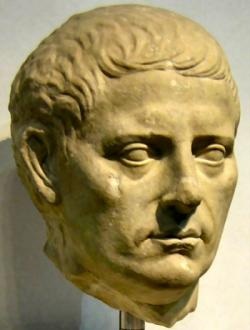Suetonius
Suetonius was an aspiring politician who ended up being the State Librarian and Archivist for the Emperor Trajan, and the Secretary of Hadrian. He was sacked in ad119, allegedly because he was having an affair with the Empress(!), but probably because Hadrian had taken exception to something Suetonius had written in his Life of Augustus.
Suetonius was a very powerful writer - it is from Suetonius that we have our most powerful images of the Roman emperors – Caligula making his horse a consul; Claudius’s awkward walk and stammer; Nero fiddling while Rome burned etc. The book and TV series I Claudius was primarily based on Suetonius.
Can you believe a word he says? Certainly he never omits an unlikely piece of juicy gossip unless he can find an even-more-crazy allegation to top it. Historians today tend to think that he reported his sources (such as Fabius Rusticus and Cluvius but also, as far as we ascertain, court gossip too) accurately ... but did little or no work sifting his sources to separate the true from the false.
Therefore, until the 1950s (and the German historian W Steidle) Suetonius was dismissed as merely 'a mechanical collector of gossip'. Certainly he rarely passes judgement on his subjects. But historians today tend to accept that that Suetonius had an opinion - he was writing biography not history, and Roman biographers wanted their subjects to be 'exemplars' (of the good and the bad). A Wallace-Hadrill (1983) suggested that Suetonius had hoped his book would be a guide for the Emperor Hadrian about how to be a good emperor.
1. Strengths of Suetonius
* used contemporary sources (though he rarely
credits them)
* he was honest and accurate in reporting what his sources said
* had personal experience of government and palace politics
* understood Roman religion (he was a priest)
* some evidence that he was neutral/impartial (pro-Empire, but defended the Senate)
2. Weaknesses of Suetonius
* he was writing instructional biography not
explanatory history
* writing two centuries after the events
* filled his account with anecdotes and gossip rather than historical facts
* only as reliable as his sources (which were VERY unreliable)
* after his dismissal in ad119 he did not have access to the imperial records
* rarely named and made little attempt to judge sources (just conveyed their content accurately)
* focussed on the personalities not the events
* focussed on character not explanation
* was writing for a reason - to portray 'good' and 'bad' rulers ... he is selling 'a view'
* was writing about the emperors not Agrippina.
3. Methods of Suetonius
* he wrote his Lives as a thematic
biography, and ignored chronology/dates
* he selected anecdotes (in preference to factual narrative) to illustrate character
* he was writing for a reason - to portray 'good' and 'bad' rulers ... he is giving 'a view'
* he sometimes gives alternative accounts, but does not name his sources
* little or no attempt to judge reliability of his sources
* VERY interesting/ scandalous/ entertaining.

Links:
The following web pages will help you complete the task:
Before you begin to study Suetonius, you would be wise to read Mr Clare's blog-post on Agrippina and her Sources.
This document contains the relevant sections of the set
OCR Textbook.
Suetonius - Mr Clare's factsheet
Task
Read the following passages from Suetonius, and write answers to the questions which follow:
Claudius 29.3 – the ‘marriage’ of Messalina and Silius
Surely it is too much to believe that he himself signed the contract for the dowry in the marriage of Messalina and Silius just because the freedmen persuaded him that the marriage was really a fake, arranged so that they could transfer to another a certain danger which the omens said was threatening the emperor himself.
Claudius 44.2 – the death of Claudius
There is general agreement that Claudius was poisoned, but a lot of argument about when it happened and who poisoned him. One version is that it was his food-taster, the eunuch Halotus, during a feast with the priests in the Citadel. Another view is that Agrippina herself did it at a family dinner when she gave him poisoned mushrooms, his favourite food. There are differences in the stories of what happened afterwards.
Nero 28.2 – Nero’s incest with Agrippina
No one doubted that he even wanted sexual relations with his own mother, and was prevented by her enemies, afraid that this ruthless and powerful woman would become too strong with this sort of special favour. What added to this opinion was that he included among his mistresses a certain prostitute who they said looked very like Agrippina. They also say that, whenever he rode in a litter with his mother, the stains on his clothes afterwards proved that he had indulged in incest with her.
Nero 34.4 – Nero after Agrippina’s murder
Credible writers provide horrible facts: he could not wait to see the dead body; he held her limbs; he criticised some and praised others; being thirsty during all this he had drinks.
What do these passages tell us about the way Suetonius wrote his Lives. [4]
Do you think that Suetonius gives us a reliable account of the emperors?
Refer both to the passages, and to your knowledge of Suetonius as a writer. [18]